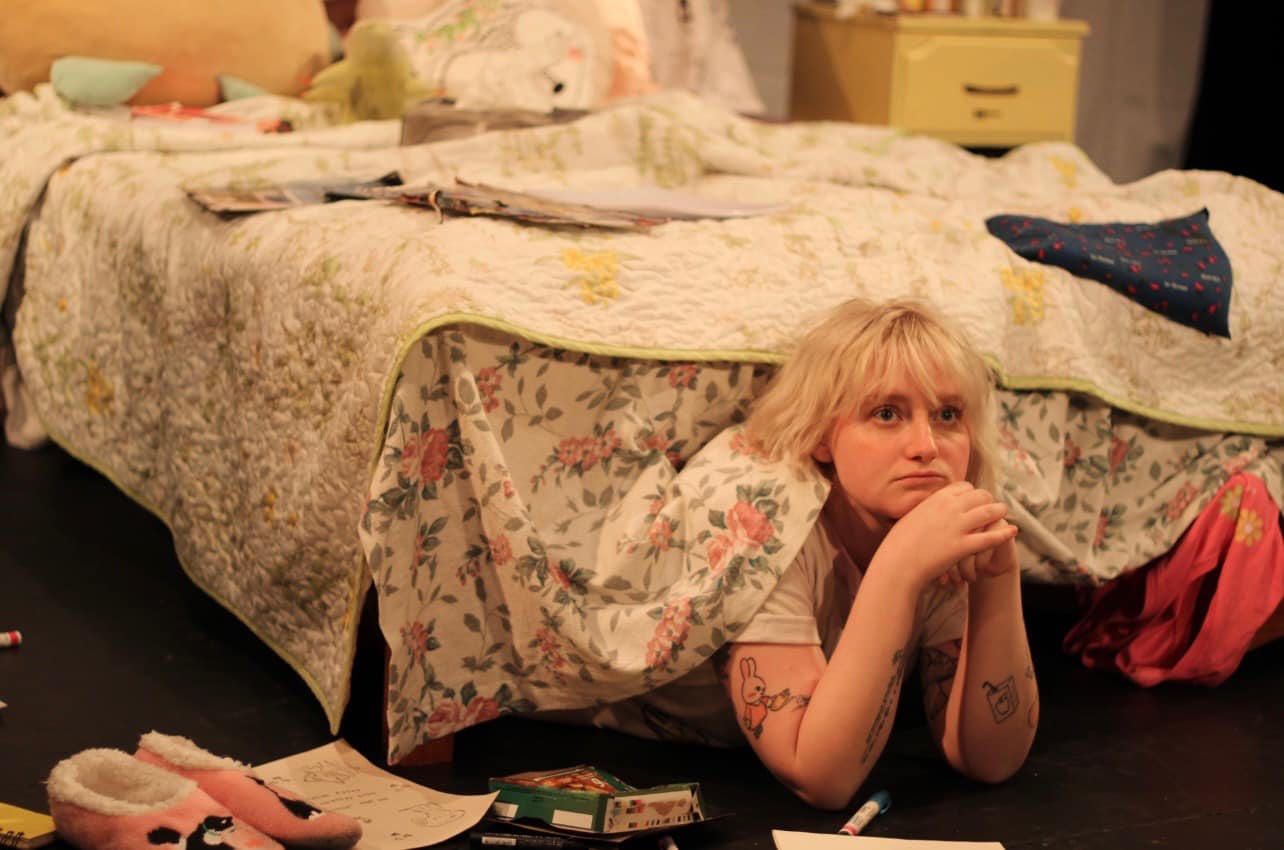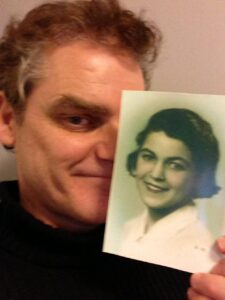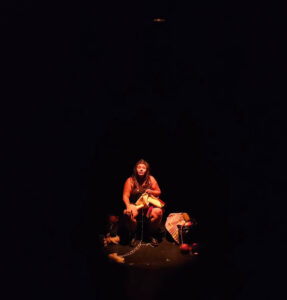
Sara Graham in Lifespan of a Mattress
In Sara Graham’s play Lifespan of a Mattress, which plays at the Bus Stop Theatre as part of OutFest and has its closing performance tomorrow, Sunday April 28th, at 3:30pm, we meet Aubrey, a young Disabled person who recently has had to stay confined to their bedroom due to the pain they have been experiencing. The play does not go into detail about Aubrey’s disability, but we hear snippets from voice mail messages from doctors that give us a sense that Aubrey’s condition is chronic and that the doctors are not providing them with many answers either for reliable daily management of this pain, or for a concrete idea of what their future will look like. The play explores how isolating this experience can be, and how, even when Aubrey has well meaning friends in the room with them, the friends’ inability to understand the breadth of Aubrey’s experience and all its ramifications is what can make them loneliest of all.
Aubrey’s bedroom is in chaos, as they are well enough to be fully living in it, but not well enough to be able to keep it tidy. They are embarrassed to be living like this, judging themselves for not having the capacity to get up every day and shower and take care of the household tasks, even though they are also not currently working. Watching Pride and Prejudice and other movies of that ilk comfort them, as an anchor amid a voicemail box full of stress. Their friends, Cam played by Kiana Josette, and Jude, played by Sophie Schade, come over often uninvited to hang out, which both maintains their bonds of friendship, but also is a constant reminder for Aubrey of what they’re missing out on in the life they used to share in the outside world, while also being a constant invasion of their privacy.
For me, and perhaps because it mirrors so much and so beautifully what I have experienced this year as well, the balance between Aubrey needing their friends for comfort, companionship, sanity, and also literal help, and Aubrey not wanting even their closest friends to be privy to just how much they are struggling, or the private nuances of the ways in which they are struggling (and coping), is the crux of the show. In a way Aubrey is lucky to have Cam and Jude continually showing up, checking in, but despite their disability, Aubrey is also entitled to have boundaries. What happens when a disability robs someone of being able to decide for themselves when and how they choose to ask for help? When help is all of a sudden thrust upon them… and they’re expected to just be grateful… because what is the alternative?
Things get extra difficult for Aubrey when their relationship with Jude changes, and I wondered if there might be more to explore in this dynamic? Aubrey and Cam are best friends, and in later scenes we do see that there is an ease that Aubrey has with Cam that suggests maybe they have known each other longer, whereas Jude is someone that Aubrey wants to impress. I wondered if it might help to build the stakes in Aubrey and Jude’s relationship if from the beginning we see Aubrey holding firmer boundaries with Jude, trying, maybe even to the determent of their own health, to maintain a façade of being healthier and more “put together” than they are, so that when the boundary is broken and the truth is exposed it is even more devastating for Aubrey, and disorienting for Jude. I also wanted to know more about the artwork that Aubrey is working on throughout the show, and for there to be clearer stakes from the beginning involved for what that work means to them and their future. I love the way everything culminates; I think it might have even more of an impact if we can see a longer and bit clearer build-up.
The dynamics between the three actors, crammed often onto a small bed, ring really true of people who are trying to do the right thing, trying to say the right thing, trying to be the people they think they should be, but who are struggling to make it all be true. Yet, at the crux, it is the care that the audience feels; the ways that the three are communicating are imperfect, but the care that they have for one another is real.
Director Rooks Field-Green is using a lot of creativity and imagination in the way he uses the small space, playing with how cramped and small it is, and with how these three people are navigating and negotiating around a mess that is always a bit of the elephant in the room.
Lifespan of a Mattress plays on the Emerging Stage of OutFest, and it is a really strong emerging play, very poignant, and funny, with themes and questions that I think a lot of people might not have considered before in exactly this way. I hope to see the show get further developed, and to be produced again in the future. This is a story that deserves a wider audience.
Think of the Worst Theatre’s Lifespan of a Mattress plays at The Bus Stop Theatre (2203 Gottingen Street, Halifax) as part of OutFest at the following times:
April 28th, 2024 at 3:30pm.
The show is 60 minutes and masks are mandatory. Tickets are $16.50 and are available here.
The Bus Stop Theatre is located at 2203 Gottingen Street and is wheelchair accessible with gender-neutral washrooms.






